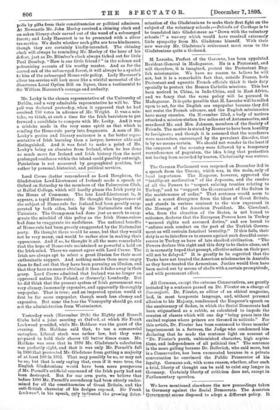All Germans, except the extreme Conservatives, are greatly irritated by
a sentence passed on Dr. F5rster on a charge of lese.inajeste. Dr. Forster, as editor of an ethical magazine, had, in most temperate language, and, without personal allusion to his Majesty, condemned the Emperor's speech on the anniversary of Sedan, in which the Social Democrats had been etigmatised as a rabble, as calculated to impede the reunion of classes which will one day "bring peace into the exalted regions where princes are throned in solitude." For this article, Dr. Forster has been sentenced to three months' imprisonment in a fortress, the Judge who condemned him declaring that he made the sentence light on account of "Dr. Forster's youth, unblemished character, high aspira- tions, and independence of all political ties." The sentence is the more galling because Dr. Delbrfick, who said more, but is a Conservative, has been exonerated because in a private conversation he convinced the Public Prosecutor of his loyalty. Germans ask, with some reason, whether, after such a trial, liberty of thought can be said to exist any longer in Germany. Certainly liberty of criticism does not, except in Parliamentary speeches.






















































 Previous page
Previous page